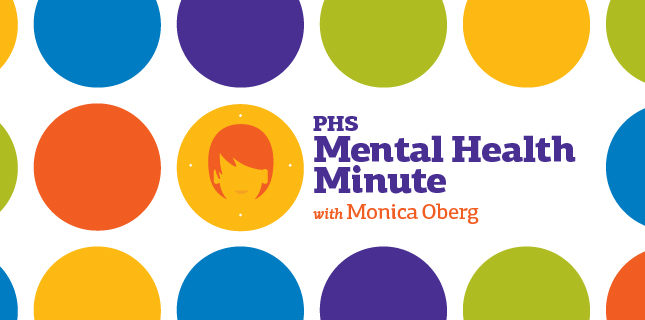Mental Health Minute: Maintaining Friendships While Caring for a Medically Complex Child

It is crucial for parents and caregivers of children with medical complexities to take the time to care for their mental health. With our new series Mental Health Minute, PHS clinical social worker Monica Oberg will answer questions from parents and caregivers about navigating the stresses and concerns that come with this journey, from grief and balance to the isolation many parents experience.
For this installment of Mental Health Minute, we are answering a question about maintaining friendships while juggling the responsibilities of raising a child with complex medical needs.
You can find past Mental Health Minute articles here and here. Do you have a question that you would like Monica to answer? Leave it below!
“Life with a medically complex child can be really isolating. How can I build and maintain friendships with others while still meeting my child’s needs?”
Whether you’re a new parent to a child with special needs or have been a member of this club for many years, your life likely looks different than what you had anticipated it would 10 years ago, 1 year ago, or even 1 week ago. Your day to day schedule may be very regimented with little room for flexibility, and the demands of parenthood are likely constant – impacting everything from time for self-care to careers and often, relationships.
Friendships have an impact on our longevity and helps decrease stress levels. It also helps us to have a healthy, happy, and meaningful life. It’s nice to ask others for advice who are in similar situations, have someone empathize with you, have someone celebrate small wins with you, give you support and encouragement. Quite simply, friendships are important and help make life more manageable.
Quality over quantity
Be picky about your friendships, focusing on the quality of those you stay connected with rather than the number. Any parent – and particularly parents of children with medical complexities – are often trying to juggle many tasks. Be sure to focus on friendships that help you grow and feed your soul, not those that drain you. Give your energy to those who respect you, your time, and your situation (and vice versa). Think about your friendships right now and what’s important.
You don’t have time for toxic friends just because they’ve been your friend for the past 10 + years. Relationships may change depending on your new interests as a parent, and your child’s needs or interests. You might develop new friendships with more like minded people compared to when you made friends in elementary, high school or college. Letting go is okay if it’s what serves you best.
Developing new friendships
There is certainly no need to eliminate friends from your life simply because they aren’t going through the same experiences as you – having relationships with people who come from a wide range of backgrounds and lifestyles is what makes friendships so unique and beneficial. But developing new friends who share similar experiences or interests can be rewarding and incredibly fulfilling. They will help support and guide you, sharing what they’ve learned and help you learn even more about yourself.
Online groups also make it easier to find like-minded people in your area – specifically those for parents of children with special needs. And while I encourage parents to maintain in-person friendships, groups like the Minnesota Special Needs Support Group may open up opportunities to build relationships with others or at least offer connection and understanding through a keyboard.
Personal time (guilt free)
Have you ever heard the saying “you can’t drive a car on an empty tank of gas?” Remember that the next time you are feeling bad for taking time to “fill up your gas tank” by maintaining your friendships.
You can’t expect your car to work if you aren’t taking the time to keep it properly fueled. Time is a challenge, but I recommend trying to make a point to do something socially once a week, whether it’s with your child or on your own. Find a support group, a parent group, participate with your children’s sports teams, meet new friends at you child’s school. Build time with friends into activities that are already incorporated into your schedule. What are your interests? Can you take a community education class or go to weekly workout session with a friend? Even just a weekly phone date with a friend offers great benefits of feeling connected and supported.
This road is a marathon, not a sprint – and fueling yourself physically, emotionally, and mentally is critical to your health and wellbeing. Remember that if you’re feeling guilty about building personal time into your schedule.
Originally published: August 22, 2019

